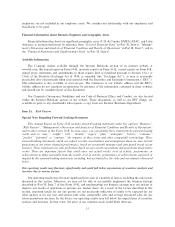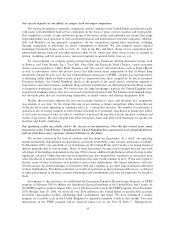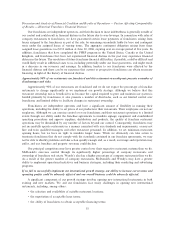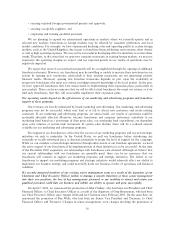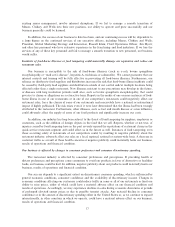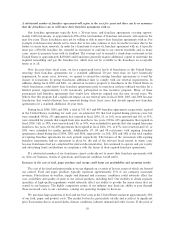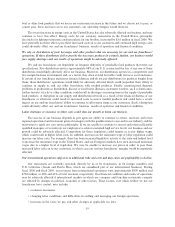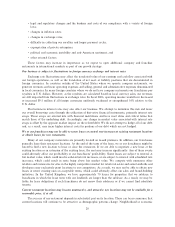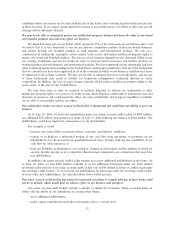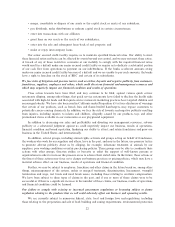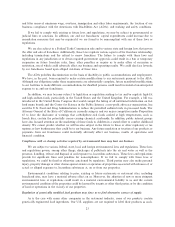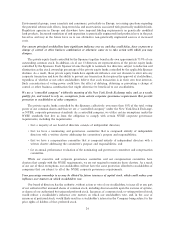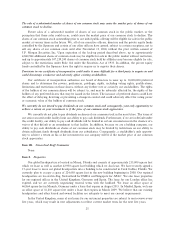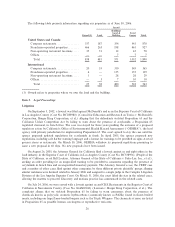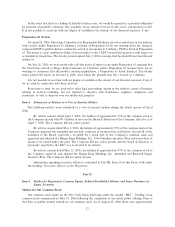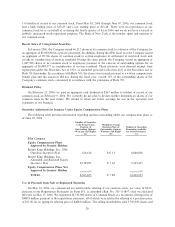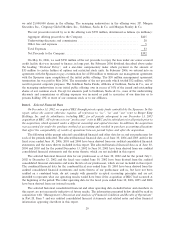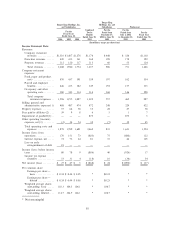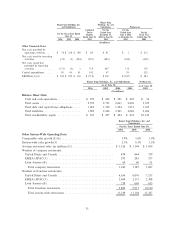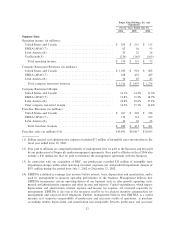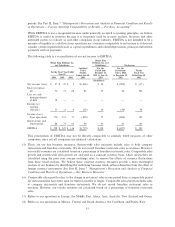Burger King 2006 Annual Report Download - page 35
Download and view the complete annual report
Please find page 35 of the 2006 Burger King annual report below. You can navigate through the pages in the report by either clicking on the pages listed below, or by using the keyword search tool below to find specific information within the annual report.and litter removal; minimum wage, overtime, immigration and other labor requirements; the taxation of our
business; compliance with the Americans with Disabilities Act (ADA); and working and safety conditions.
If we fail to comply with existing or future laws and regulations, we may be subject to governmental or
judicial fines or sanctions. In addition, our and our franchisees' capital expenditures could increase due to
remediation measures that may be required if we are found to be noncompliant with any of these laws or
regulations.
We are also subject to a Federal Trade Commission rule and to various state and foreign laws that govern
the offer and sale of franchises. Additionally, these laws regulate various aspects of the franchise relationship,
including terminations and the refusal to renew franchises. The failure to comply with these laws and
regulations in any jurisdiction or to obtain required government approvals could result in a ban or temporary
suspension on future franchise sales, fines, other penalties or require us to make offers of rescission or
restitution, any of which could adversely affect our business and operating results. We could also face lawsuits
by our franchisees based upon alleged violations of these laws.
The ADA prohibits discrimination on the basis of disability in public accommodations and employment.
We have, in the past, been required to make certain modifications to our restaurants pursuant to the ADA.
Although our obligations under those requirements are substantially complete, future mandated modifications
to our facilities to make different accommodations for disabled persons could result in material unanticipated
expense to us and our franchisees.
In addition, we may become subject to legislation or regulation seeking to tax and/or regulate high-fat
and high-sodium foods, particularly in the United States and the United Kingdom. For example, a bill was
introduced in the United States Congress that would compel the listing of all nutritional information on fast
food menu boards and the Center for Science in the Public Interest, a non-profit advocacy organization, has
sued the U.S. Food and Drug Administration to reduce the permitted sodium levels in processed foods. The
Attorney General of the State of California is currently suing us and our major competitors under Proposition
65 to force the disclosure of warnings that carbohydrate-rich foods cooked at high temperatures, such as
french fries, contain the potentially cancer-causing chemical acrylamide. In addition, public interest groups
have also focused attention on the marketing of these foods to children in a stated effort to combat childhood
obesity. We cannot predict whether we will become subject in the future to these or other regulatory or tax
regimes or how burdensome they could be to our business. Any future regulation or taxation of our products or
payments from our franchisees could materially adversely affect our business, results of operations and
financial condition.
Compliance with or cleanup activities required by environmental laws may hurt our business.
We are subject to various federal, state, local and foreign environmental laws and regulations. These laws
and regulations govern, among other things, discharges of pollutants into the air and water as well as the
presence, handling, release and disposal of and exposure to, hazardous substances. These laws and regulations
provide for significant fines and penalties for noncompliance. If we fail to comply with these laws or
regulations, we could be fined or otherwise sanctioned by regulators. Third parties may also make personal
injury, property damage or other claims against owners or operators of properties associated with releases of, or
actual or alleged exposure to, hazardous substances at, on or from our properties.
Environmental conditions relating to prior, existing or future restaurants or restaurant sites, including
franchised sites, may have a material adverse effect on us. Moreover, the adoption of new or more stringent
environmental laws or regulations could result in a material environmental liability to us and the current
environmental condition of the properties could be harmed by tenants or other third parties or by the condition
of land or operations in the vicinity of our properties.
Regulation of genetically modified food products may force us to find alternative sources of supply.
As is the case with many other companies in the restaurant industry, some of our products contain
genetically engineered food ingredients. Our U.S. suppliers are not required to label their products as such.
23


